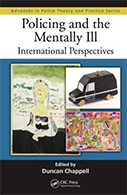Policing and the Mentally Ill: International Perspectives

Author: Duncan Chappell
Publisher: Boca Raton, FL: CRC Press, 2013. 381p.
Reviewer: Rosalyn Bocker Parks | March 2014
Duncan Chappell’s Policing and the Mentally Ill: International Perspectives offers a cross-cultural evaluation of how the police interact with the mentally ill, and related policies and problems. It also touches on mental health issues within police organizations, including mental illness in police officers and the associated high suicide rate. According to the World Health Organization, approximately 25 percent of all individuals will develop one or more mental or behavioral disorders in their lifetime, and it is not unexpected that these individuals are likely to come into contact with law enforcement at some point in their lives. According to this book, about 10 percent of police interactions with the community involve an individual with mental or behavioral disorders. Yet despite these statistics, there is a dearth of empirical research and policy evaluations of policing strategies in this area. Worldwide cultural barriers and the fear and stigma surrounding mental illness have further added to the scarcity of available literature.
This work begins with a discussion of the 1998 incident in Memphis, Tennessee where a mentally ill man was killed by police. This tragedy spurred the creation of specialized police responses to incidents involving mental illness such as special police response teams (SPR) and crisis intervention teams (CIT). Since that time, partnerships among the police, healthcare organizations and mental health professionals have worked to design initiatives that seek to provide better responses to and resources for police interactions with the mentally ill.
These initiatives spread throughout North America, Europe and Australia, with individual countries designing their own response policies. In addition to describing these policies and reviewing their evaluations, Policing and the Mentally Ill also examines the difficulties of policing and mental health in developing nations. Here, traditional beliefs, cultural boundaries, and a lack of legislation often limit an individual’s access to mental healthcare and hamper police responses.
A considerable strength of this work is its accessibility. While suitable for academics and advanced research practitioners, the information and policy reviews offered here are written in a style appropriate for inclusion in undergraduate courses. Its readability will also appeal to both police and mental health practitioners seeking to broaden their understanding of the issues surrounding police practice and the mentally ill.
This collection also seeks to reach an international and diverse audience through an international dialogue. The book falls short of its goal to be comprehensive, however. Its main weakness is its disproportionate representation of “international” research. While titled as an international perspective, 10 of the 16 chapters focus on developments in Australia. Canadian and American research in this field account for a chapter each, but there is a notable absence of European research included here. The included selections are also very Western-focused. The three chapters dedicated to research in developing nations present findings from Hong Kong, Africa, and Papua, New Guinea. While thorough in their own right, there is too little information here to have a truly international review of policing and the mentally ill.
Even with this limitation, Chappell’s Policing and the Mentally Ill highlights important trends in police services across countries in a clear, concise manner. Students, academics, and police and mental health practitioners all can benefit from reading this collection. Its contents offer important insights into an often marginalized issue and offer a well-organized review of the current state of the literature.
Rosalyn Bocker Parks, PhD Candidate, Rutgers University, School of Criminal Justice


